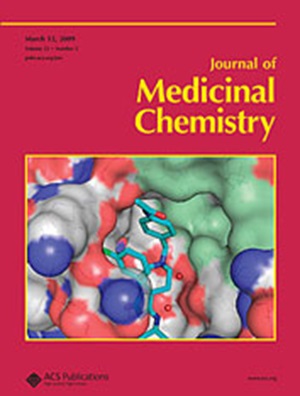Intercepting the Downstream of the Estrogen Receptor Signaling Pathway: Discovery of a Potent and Efficient SRC-3 PROTAC Degrader for Overcoming Endocrine Resistance Breast Cancer
IF 6.8
1区 医学
Q1 CHEMISTRY, MEDICINAL
引用次数: 0
Abstract
The oncogene steroid receptor coactivator-3 (SRC-3) plays a pivotal role in the downstream transcriptional regulation mediated by the estrogen receptor (ER), thereby promoting the occurrence and progression of endocrine resistance in breast cancer. Herein, we disclose a novel series of potent SRC-3 PROTACs to overcome endocrine resistance. These PROTACs were able to efficiently degrade SRC-3 and inhibit the proliferation of wild-type and endocrine-resistant breast cancer cells. Notably, compound BY13 could significantly inhibit the growth of drug-resistant breast tumors without observed toxicity in mice. Mechanism studies indicated that the degradation ability of these SRC-3 PROTAC degraders is ubiquitin proteasome system (UPS) pathway-dependent. Moreover, BY13 displays a highly selective blocking effect on the ER signaling pathway over that of the androgen receptor. This proof-of-concept study firmly confirms that SRC-3 is a promising therapeutic target for breast cancer treatment and highlights BY13 as a lead compound for developing novel therapeutics to overcome endocrine resistance in breast cancer.

阻断雌激素受体信号通路的下游:发现一种有效的SRC-3 PROTAC降降剂来克服内分泌抵抗性乳腺癌
癌基因类固醇受体共激活因子-3 (SRC-3)在雌激素受体(ER)介导的下游转录调控中起关键作用,从而促进乳腺癌内分泌抵抗的发生和发展。在此,我们披露了一系列新的有效的SRC-3 PROTACs来克服内分泌抵抗。这些PROTACs能够有效地降解SRC-3并抑制野生型和内分泌抗性乳腺癌细胞的增殖。值得注意的是,化合物BY13可以显著抑制耐药乳腺肿瘤的生长,对小鼠无毒性。机制研究表明,这些SRC-3 PROTAC降解物的降解能力依赖于泛素蛋白酶体系统(UPS)途径。此外,BY13对内质网信号通路表现出高度选择性的阻断作用,而不是雄激素受体。这项概念验证研究有力地证实了SRC-3是一种有前景的乳腺癌治疗靶点,并强调BY13是开发新型治疗方法以克服乳腺癌内分泌抵抗的先导化合物。
本文章由计算机程序翻译,如有差异,请以英文原文为准。
求助全文
约1分钟内获得全文
求助全文
来源期刊

Journal of Medicinal Chemistry
医学-医药化学
CiteScore
4.00
自引率
11.00%
发文量
804
审稿时长
1.9 months
期刊介绍:
The Journal of Medicinal Chemistry is a prestigious biweekly peer-reviewed publication that focuses on the multifaceted field of medicinal chemistry. Since its inception in 1959 as the Journal of Medicinal and Pharmaceutical Chemistry, it has evolved to become a cornerstone in the dissemination of research findings related to the design, synthesis, and development of therapeutic agents.
The Journal of Medicinal Chemistry is recognized for its significant impact in the scientific community, as evidenced by its 2022 impact factor of 7.3. This metric reflects the journal's influence and the importance of its content in shaping the future of drug discovery and development. The journal serves as a vital resource for chemists, pharmacologists, and other researchers interested in the molecular mechanisms of drug action and the optimization of therapeutic compounds.
 求助内容:
求助内容: 应助结果提醒方式:
应助结果提醒方式:


